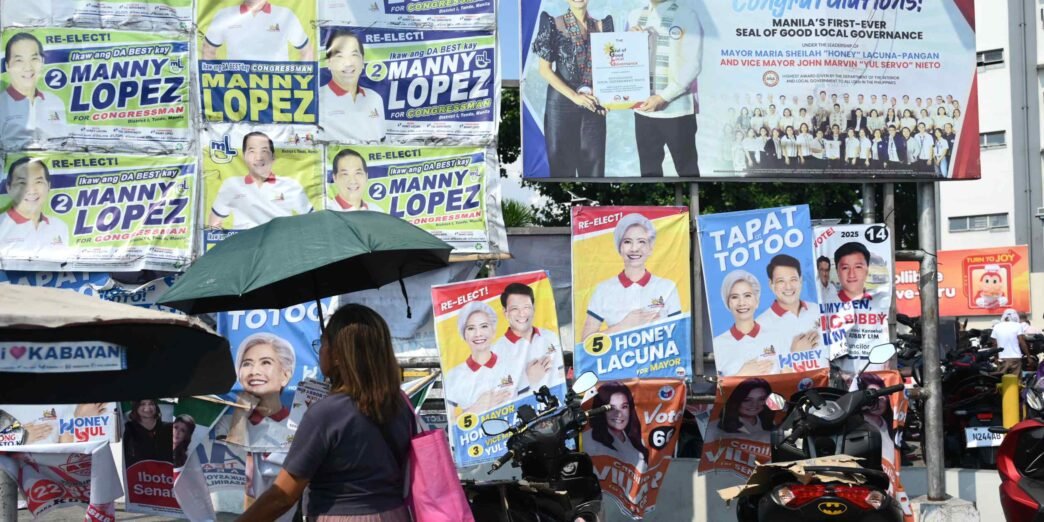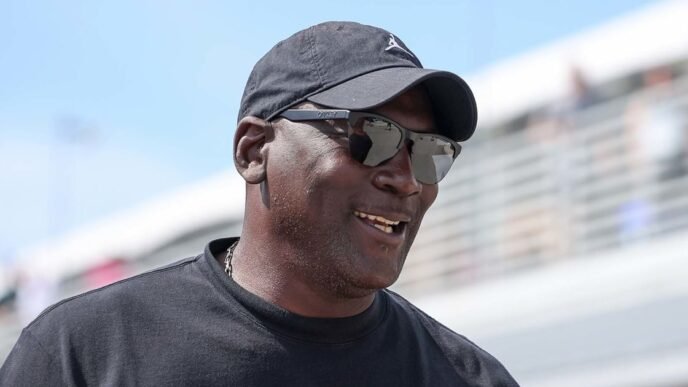MANILA — Tens of millions of Filipinos have voted in the country’s midterm elections, which will decide half the 24-strong Senate, all 317 members of the House of Representatives and thousands of local municipal leaders and legislators.
Polls closed at 7 p.m. local time, and initial partial and unofficial results show that the nation — based on the key race for 12 Senate seats — is split pretty evenly between incumbent President Ferdinand Marcos Jr. and his predecessor, Rodrigo Duterte. Official declarations are due in a week, after candidates have had a chance to challenge the outcome.
We are bringing you the results as they come and analysis on what they mean for one of the fastest-growing economies in Southeast Asia. Some of our recent coverage of the campaign, the economy and former President Rodrigo Duterte’s detention by the International Criminal Court are at the bottom:
All times are local to the Philippines.
10:45 p.m. More than 76% of the registered voters’ ballots have now been tabulated, albeit they are unofficial, and there has been no change in the top 12 in the race for the 12 Senate seats since the first partial returns were declared more than an hour ago.
The leading candidate, Christopher Go, has 24.5 million votes, while the 12th placed candidate has 12.1 million votes — more than 1 million ahead of the 13th placed candidate.
Just to remind you, five of the 12 are considered supporters of incumbent President Fedinand Marcos Jr., five are Duterte loyalists, and two are unaffiliated.
10:35 p.m. More from the GMA News interview with Senator Christopher Go, who is seeking re-election and is leading the race for the 12 Senate seats. He declines to speculate on what the election results would mean for the functioning of the Senate.
“I cannot say for now. I don’t want to get ahead of it, as the results are still partial,” he says. “The possible winners were the ones recently adopted by the party. So I cannot tell yet the new composition of the incoming Senate. This is still the period where it will have to sink in first.”
10:15 p.m. Duterte loyalist Senator Christopher “Bong” Go, who is seeking re-election and is leading the Senate race based on partial and unofficial returns, has just given his first interview since the results started to be declared.
“I would like to thank the people who continue to trust me and to former President [Rodrigo] Duterte who has been my mentor in public service,” he tells GMA News, a local TV station. “He only reminded me of one thing. He does not interfere with us in how we do our jobs. But he only told me one thing: just do what is right. Prioritize the interests of the nation, prioritize the interests of the Filipino people. And that is what I have been doing ever since my first term, I just served.”
“Thank you for your trust in me, as a country bumpkin, you gave me a chance to serve,” he says. “I will not waste the trust you gave me. Hard work, compassion, and more public service [are] all that I can offer to our people.”
10 p.m. Local TV stations are now reporting the unofficial election commission results from 68% of polling stations, and they are still the same as we reported 45 minutes ago. However, there is no information on where in the country the declared results are from, so there is no way to tell how the outstanding votes might affect the final result.
9:45 p.m. Former President Rodrigo Duterte is well on the way to winning the race to be the next mayor of Davao City on the southern island of Mindanao, even though he is in International Criminal Court detention in The Netherlands.
With 62% of votes counted, the unofficial results show he has 504,729 votes, according to election commission returns. His nearest challenger, Karlo Nograles, has 62,269 votes.
Duterte was allowed to run in the election despite being arrested because he has yet to be convicted of a crime.
His son, Sebastian Duterte, was the outgoing mayor and ran as his father’s deputy in this race.
9:30 p.m. Duterte loyalists Christopher “Bong” Go and Ronald “Bato” Dela Rosa are in first and third places in the initial partial and unofficial results for the Senate, with 58% of returns declared. Between them is Paolo Aquino, an independent former senator and cousin of former President Benigno Aquino III.
In fourth place is Marcos supporter Erwin Tulfo, and in fifth is unaffiliated Francis “Kiko” Pangilinan.
Three of the next five are Marcos backers and two are in the Duterte camp.
9:15 p.m. The first partial and unofficial results for the Senate are in. Local media are reporting that with 57% of results counted, five of the top 12 vote winners are supporters of the Dutertes, five are on the Marcos slate, and two are affiliated with neither camp.
Of the next three placed candidates, one is neutral and two are Marcos backers.
8:45 p.m. Vice President Sara Duterte said in a press interview in Davao City earlier on Monday that she had already told her father, former President Rodrigo Duterte, that at least two of their Senate bets have a “realistic chance” to win seats.
This is one of the most closely-watched issues in the election. To avoid conviction at her impeachment trial that is scheduled for July, Sara Duterte needs nine votes in the 24-member Senate. Of the 12 senators who are not standing for election two have said they will oppose convicting Sara Duterte while the other 10 have yet to express their views.
8:30 p.m. If you’d like a quick summ of the International Criminal Court’s allegations against former President Rodrigo Duterte, who is detained in the Netherlands, and what it means for Philippine politics, watch this Nikkei Asia video that was made shortly after he was flown to The Hague.
8:20 p.m. The elections commission reports as of 8:15 p.m. that its servers have received more than 60% of the 93,629 election returns. Essentially raw data, an election return is a document containing the numerical vote count, as well as other data, for each candidate in a specific precinct.
However, no actual results have been published.
8:00 p.m. One way the authorities have sought to reduce election-related trouble is by banning the sale and public consumption of alcohol on election day and during the preceding 24 hours.
Filipinos are among the top drinkers in Southeast Asia, and some people just could not refrain from hitting the hard stuff. Local media reported at least 159 people had been arrested on Sunday for consuming liquor in public during the period.
World Bank data showed Filipinos consumed 5.66 liters of alcohol per capita in 2020, way ahead of the average of East Asia and the Pacific (4.53 liters) and South Asia (3.19 liters).
7:45 p.m. The slate of Senate candidates backed by President Ferdinand Marcos Jr., running under the ticket Alyansa para sa Bagong Pilipinas (Alliance for a New Philippines), has “thanked” Filipinos for showing up to vote today.
The coalition’s name is a reference to a political party formed by the president’s father, the late ousted dictator Ferdinand Marcos Sr.
“We ran a clean campaign based on clear platforms, solid track records, and firm positions on real issues. No gimmicks. No shortcuts,” a statement read.
7:30 p.m. Voters’ apathy about candidates’ policy platforms, or lack thereof — regardless of what they tell the opinion surveys — is epitomized by Senate candidate Willie Revillame.
The TV host has been wooed by the Dutertes to enter politics, declining a run during the 2022 presidential election.
He’s wildly popular among the masses, thanks to his daytime shows, but has shown he’s still a neophyte when it comes to politics. His campaign platform? Helping the poor.
“When I win, that’s when I’ll think about it,” he said in a TV interview when he was asked about his legislative proposals.
7:20 p.m. Civil society has often encouraged Filipinos to be more discerning when selecting politicians, whether they’re voting for city mayors or selecting the next crop of senators.
In this campaign, surveys showed that most Filipinos would vote for senate candidates hailing from established dynasties or those gunning for re-election.
Ahead of voting day, Christopher “Bong” Go and Ronald “Bato” Dela Rosa, were projected to win their re-election bids in the Senate. Go used to be an aide of former President Rodrigo Duterte, while Dela Rosa was his police chief and widely considered the ‘architect’ of the war on drugs that killed thousands of Filipinos.
Others slated to win included boxing legend Manny Pacquiao, Ramon “Bong” Revilla Jr., an actor and former politician who was acquitted of plundering taxpayer funds, and Willie Revillame, a controversial celebrity TV host looking to kickstart his career in politics.
7 p.m. Polls have now closed, although voters still in line at polling stations will be allowed to cast their ballots.
6:50 p.m. Political analyst Richard Heydarian described these midterm elections as “unprecedented.”
“You obviously have the escalating tensions between the House of Duterte and the House of Marcos. We have had nothing like it in recent memory,” he told Nikkei Asia.
He suggested that pro-Duterte candidates will benefit from bloc voting and endorsements, alluding to the practice of religious groups in the Philippines. Over 2.8 million Filipinos in 2020 identified themselves as members of the Iglesia ni Cristo, a Christian sect popular in the fiercely Catholic nation whose endorsement is keenly sought after by candidates.
Besides that, Heydarian noted the shadow of the U.S.-China rivalry. The Philippines is a treaty ally of Washington, and shares concerns with China’s growing influence in the region.
Philippine security officials told the public to be w of foreign interference in this year’s elections, alluding to China’s possible role.
“The Americans are clearly invested in the Marcos Jr. administration, while the Chinese are gung-ho on getting the Dutertes back to power,” Heydarian said.
On top of that, Vice President Sara Duterte’s crisis, of whether she gets convicted by senators in an upcoming impeachment trial, hangs in the balance too.
“If the Dutertes survive this, they can turn it around into a massive comeback story, not too different from what the Americans experienced in the case of the second Trump presidency not long ago,” he added.
6:40 p.m. Filipinos aged under 40 comprise more than half the electorate, according to the elections commission.
The nation’s median age was 25 in 2023, the second-youngest in ASEAN after Laos, according to a report by the ASEAN+3 Macroeconomic Research Office.
This supports the assessment of Philippine economic analysts that the so-called demographic dividend is one of the country’s key growth drivers.
6:30 p.m. rge Garcia, chair of the Philippine Commission on Elections (Comelec), has just given an update on when he is expecting results. Remember, polls close at 7 p.m., in 30 minutes.
“Before 10 o’clock, we are expecting that most of the precincts will have their results sent already,” he told the media. “Our earliest expectation is actually 8:30.”
Results sent to the Comelec should be uploaded to the central, public facing, server automatically and almost immediately. These are still unofficial — candidates have about a week to contest the returns.
6:20 p.m. Filipinos vote in cramped polling stations, which are often located at public schools. At virtually all locations only a folder, at most, ensures that voters’ choices are protected from onlookers.
They need to shade the ballots for a maximum of 12 senators, a party-list group, a district representative for the House, a governor and his/her deputy for those registered to vote in the countryside, or a mayor and deputy for those living in urban areas, and local councilors.
Exacerbating conditions for voters are soaring temperatures across the country, which is in the middle of the dry season.
To guard against any untoward incidents such as violence, police and sometimes the milit are deployed to areas deemed to be “hotspots” by the government.
6:10 p.m. Most eyes will be on the Senate election because the upper chamber of Congress will take the spotlight in July when it conducts the trial of Vice President Sara Duterte, who was impeached by the House in Febru on an array of charges, including allegedly plotting to assassinate President Ferdinand Marcos Jr.
Analysts see the elections as a proxy battle between the Marcos and Duterte families. In addition to Sara Duterte facing trial, her father, former President Rodrigo Duterte, is being detained by the International Criminal Court in The Netherlands, accused of crimes against humanity in relation to his war on drugs when president, and, before that, as mayor of Davao City on the southern island of Mindanao.
Rodrigo Duterte is running to become mayor of Davao City again.
6 p.m. The Philippines’ bicameral Congress is modelled on the U.S., with a House of Representatives and Senate. All House members are elected every three years while Senators serve for six years with half being elected in the midterms and half at the same time as the president.
In the House, district representatives are allocated 254 of the 317 seats. The remaining 63 seats are filled by so-called party list members, who represent minorities and groups considered marginalized.
The Senate election is a nationwide contest with all the candidates listed on the ballot paper. The 12 who receive the most votes are elected. There are 66 Senate candidates this year.
House members are limited to serving three consecutive three-year terms. Senators can serve two six-year terms. All members of Congress can run for office again after taking a break for one term.
—
Here is some of our recent coverage:
In Philippines election, personality trumps policy as economic storm brews
Philippine Q1 GDP misses forecasts as Trump trade war starts to bite
Duterte family retains strong support in Davao City heartland
Trump policies threaten to shake foundation of shock-resistant Philippine peso
Duterte’s ICC detention, disinformation loom large in Philippine midterms
Philippine central bank cuts rates in wake of Trump tariff flip-flops
‘Martyr’ Duterte seeks to capture the hearts of the Philippine public
Ex-Philippine President Duterte faces lengthy legal battle at ICC













